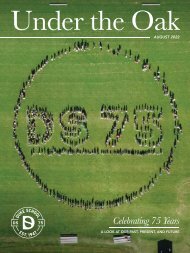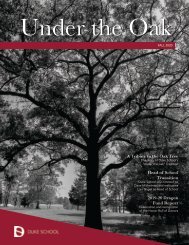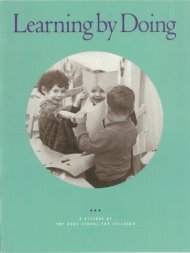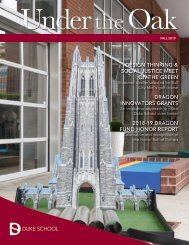The Duffer Brothers - Looking Forward, Looking Back
An excerpt from Duke School's Under the Oak Magazine, Fall 2017.
An excerpt from Duke School's Under the Oak Magazine, Fall 2017.
Create successful ePaper yourself
Turn your PDF publications into a flip-book with our unique Google optimized e-Paper software.
<strong>The</strong> <strong>Duffer</strong><br />
<strong>Brothers</strong> –<br />
<strong>Looking</strong><br />
<strong>Forward</strong>,<br />
<strong>Looking</strong><br />
<strong>Back</strong><br />
By Laura Thompson,<br />
Duke School Alumna<br />
It’s early June.<br />
Matt and Ross <strong>Duffer</strong>, Duke School Class of 1999,<br />
have just returned to Los Angeles after spending<br />
much of the spring in and around Atlanta,<br />
Georgia, filming the second season of their hit<br />
Netflix series Stranger Things.<br />
<strong>The</strong> past year has been busy and a bit surreal for<br />
the twins—known professionally as the <strong>Duffer</strong><br />
<strong>Brothers</strong>. <strong>The</strong> first season of their 1980s-inspired<br />
science fiction series gathered a worldwide<br />
following and has collected a bevvy of industry<br />
awards and nominations.<br />
Now the brothers are immersed in editing the<br />
second season’s nine episodes after writing the<br />
scripts and overseeing production days that often<br />
began at 5 or 6 a.m. Visual effects sequences are<br />
being created, and soon sound mixing, coloring,<br />
scoring, and publicity will be in full swing in<br />
advance of the series’ October 27 global release.<br />
But in some ways, not much has changed since<br />
the brothers were kids growing up in Durham.<br />
It’s summer, and the <strong>Duffer</strong>s are making a movie.<br />
‘More than a hobby’<br />
Photo Credit James Minchin/Netflix<br />
Long before the <strong>Duffer</strong> <strong>Brothers</strong> introduced<br />
audiences to the residents of Hawkins, Indiana,<br />
and the Upside Down, Matt and Ross told stories<br />
in their own backyard. <strong>The</strong>ir film career began in<br />
the third grade when their parents, Allen <strong>Duffer</strong><br />
and Ann Christensen, gave them a Hi8 video<br />
camera for Christmas. <strong>The</strong>ir earliest efforts mostly<br />
starred their stuffed animals. Soon they moved<br />
on to “feature” films of about an hour long,<br />
filmed over the summer with their Duke School<br />
classmate and neighbor Tristan Smith.<br />
“Our summer movies in middle school were all<br />
generally comedies because we didn’t think we<br />
had the chops to make something serious,” said<br />
Ross.<br />
Editing was rudimentary, with the young<br />
filmmakers cutting scenes together in camera.<br />
<strong>The</strong>y played cassette tapes over the action as a<br />
soundtrack.<br />
26<br />
UNDER THE OAK
“<strong>The</strong> movies we made—I mean, they were pretty<br />
bad,” said Matt. “And then in seventh grade we<br />
made a movie that wasn’t so bad. That’s when<br />
the parents in our lives were like, ‘oh, OK.’ <strong>The</strong>y<br />
started to see that we were learning what we<br />
were doing and maybe this was actually going to<br />
be more than a hobby.”<br />
While some of their classmates spent summers<br />
away at camp, the <strong>Duffer</strong>s stayed in Durham to<br />
create their movies. <strong>The</strong>y sometimes engaged in<br />
what Matt called “guerrilla filmmaking,” stealing<br />
shots at locations around their hometown—and<br />
at least once getting shut down by management<br />
at a local mall.<br />
<strong>The</strong>ir parents followed up the gift of the camera<br />
with an iMac computer, with which the boys<br />
learned to edit their movies digitally. <strong>The</strong>y made<br />
movies for school projects in addition to their<br />
summer films.<br />
“In high school, when grades were introduced,<br />
[a video] was an instant ‘A,’ we realized,” said<br />
Matt. <strong>The</strong>ir classmates realized it, too, and soon<br />
the brothers were highly sought-after directors at<br />
Jordan High School. “<strong>The</strong>n it became like every<br />
weekend we were doing a video for somebody.”<br />
In 2001, their short thriller Mad Cell, created<br />
with Tristan, took home top prize in the under-18<br />
category at the “Real to Reel” festival in Shelby,<br />
North Carolina. By now, inspired by some of their<br />
favorite John Carpenter and Stephen Spielberg<br />
movies, they had waded into the horror-suspensescience<br />
fiction genre that has defined much of<br />
their work since.<br />
<strong>The</strong>y also knew they wanted to be professional<br />
storytellers.<br />
‘Extremely determined —<br />
and a little delusional’<br />
After high school, the brothers attended<br />
Chapman University’s Dodge College of Film and<br />
Media Arts in Orange, California.<br />
“I remember talking about going to California for<br />
film school back in at least sixth grade,” said Ross.<br />
“So it’s been quite a time that we realized this is<br />
what we want to do.”<br />
“At that point we were just extremely<br />
determined—and a little delusional,” said Matt.<br />
“Which is good. You have to be, a little bit.”<br />
Although filmmaking was an uncommon pastime<br />
among their peers in Durham, the <strong>Duffer</strong>s quickly<br />
realized that was not the case in California.<br />
“You move out here and you realize, ‘Wow, a lot<br />
of people want to do what we want to do,’” said<br />
Matt. “Meaning a lot. So it’s super competitive<br />
and really scary.”<br />
<strong>The</strong> <strong>Duffer</strong>s studied directing while also writing<br />
and editing film projects. <strong>The</strong>ir senior thesis<br />
film, Eater—about a man-eating, shape-shifting<br />
creature that might foreshadow Stranger Things’<br />
menacing Demogorgon—is full-on horror. <strong>The</strong>ir<br />
parents are credited as executive producers.<br />
“I think our parents always believed that we were<br />
serious,” said Ross. “And we were.”<br />
After leaving the supportive bubble of film school,<br />
however, things got harder.<br />
“We got an agent right out of film school, so<br />
it felt like you’re doing everything right,” said<br />
Ross. “But to actually get paid to tell stories is a<br />
different challenge entirely.”<br />
<strong>The</strong> brothers worked on some short films, but<br />
success did not come easily. <strong>The</strong>y saw many of<br />
their film school classmates leave the industry<br />
after a few years.<br />
“It’s hard to pay your rent, you can’t order a<br />
Coke with your meal,” said Ross. “It’s a bit of a<br />
struggle.”<br />
“It’s kind of like a clubhouse,” Matt said of the Los<br />
Angeles film industry. “It’s really hard for them to<br />
open the door to you to start getting paid work. It<br />
UNDER THE OAK<br />
27
was hard for people to take us seriously, especially<br />
when we were first out of college.”<br />
Finding a new direction<br />
Eventually, after trying unsuccessfully to find<br />
work as directors, the <strong>Duffer</strong>s decided to make<br />
their own opportunity. <strong>The</strong>y wrote the script for<br />
a feature-length film, Hidden, about a family<br />
sheltering in an underground bunker after their<br />
town is devastated by a mysterious outbreak.<br />
<strong>The</strong>y pitched it to film studios with the condition<br />
that they themselves would direct it.<br />
“It was kind of the only path available to us—to<br />
write something original and then not let anyone<br />
else have it,” said Matt. “We basically held the<br />
script hostage.”<br />
Warner Bros. purchased Hidden and filmed it in<br />
2012 with the <strong>Duffer</strong>s directing. However, the<br />
studio decided not to give the finished film a wide<br />
release.<br />
Nevertheless, Hidden’s script had caught<br />
the attention of director-producer M. Night<br />
Shyamalan, creator of contemporary thrillers like<br />
<strong>The</strong> Sixth Sense and Signs. Shyamalan invited the<br />
<strong>Duffer</strong>s to join the writing staff for the Fox scifi<br />
television series Wayward Pines, based on the<br />
novels of Blake Crouch.<br />
“We were really hired to just consult for a few<br />
weeks,” said Ross. “And then a few weeks turned<br />
into like six months of intense work.”<br />
Wayward Pines became a training ground for a<br />
number of young screenwriters and filmmakers<br />
who, like the <strong>Duffer</strong>s, had never worked in<br />
television before.<br />
“It was really just a boot camp for television,<br />
because we didn’t understand television at all,”<br />
said Ross. Being “thrown into the deep end, a little<br />
bit” on a big-budget project for a major network<br />
was an intense experience, “but I remember at<br />
the end of it, Matt and I looked at each other like,<br />
‘We think we can do this on our own now. We<br />
think we can put something together.’”<br />
Ordinary meets extraordinary<br />
Feeling more confident in their abilities and more<br />
secure in their prospects of finding work as writers<br />
in a pinch, the brothers again began to dream of<br />
their own storylines.<br />
“Growing up, we were movie people,” said Matt.<br />
“<strong>The</strong> genre films from the ’80s—the Spielberg<br />
stuff, the John Carpenter stuff—particularly in<br />
high school we became obsessed with some<br />
of the horror films from the ’80s. So we started<br />
talking about what a long-form version of those<br />
movies would feel like. And we got excited about<br />
that.”<br />
<strong>The</strong> idea that eventually grew into Stranger<br />
Things began with a single script. <strong>The</strong> <strong>Duffer</strong>s<br />
drafted a pilot episode with a rough outline for an<br />
eight-hour, single-season series. Recognizing that<br />
the television industry was trending away from<br />
limited series, they later revised their outline into<br />
a story that could sustain multiple seasons. <strong>The</strong>y<br />
began to pitch the series to studios.<br />
“It was not an easy sell,” said Matt. More than a<br />
dozen studios passed on the project in a week<br />
of pitches. “We came away from the first week<br />
feeling like this was not going to work.”<br />
“It was hard. We were very inexperienced. We<br />
didn’t have a track record. <strong>The</strong> one movie we had<br />
was dumped by its studio. Our producers had<br />
never done television before. It was an ensemble<br />
of kids, but it wasn’t for kids. <strong>The</strong>se executives are<br />
looking for reasons to say no, and we had about<br />
10 to 20 reasons for them to say no.”<br />
When the brothers heard that the online video<br />
streaming service Netflix might be interested in<br />
their series, they brushed up their pitch and went<br />
in for a meeting.<br />
28<br />
UNDER THE OAK
“It’s kind of scary,” said Matt. “<strong>The</strong>y don’t give a<br />
lot of reaction in the room, so we actually came<br />
out of that pitch having no idea.”<br />
But Netflix called the following day with an offer<br />
to make the full first season. “We just were beyond<br />
ecstatic when we got that phone call,” said Matt.<br />
Stand By Me had such an impact on us. That’s why<br />
the Spielberg stuff and Stephen King stuff had an<br />
impact on us, because it felt like they were stories<br />
about us and our friends.”<br />
Despite the nostalgia factor, 1980s film buffs are<br />
just one part of the show’s fan base.<br />
Stranger Things, a tapestry of 1983 suburban<br />
childhood threaded with otherworldly creatures,<br />
supernatural power and Cold War-tinged<br />
government conspiracy, clearly showcases the<br />
<strong>Duffer</strong>s’ cinematic influences.<br />
“<strong>The</strong> meeting of the ordinary and the extraordinary<br />
is our favorite thing<br />
in the world,”<br />
said Ross. “When<br />
you’re a kid in the<br />
suburbs of North<br />
Carolina, when<br />
you see movies<br />
about kids in the<br />
suburbs going on<br />
these extraordinary<br />
adventures, that<br />
just really opened<br />
our minds and<br />
excited us because<br />
we’re like, ‘oh<br />
my God, my life could be amazing.’ You start<br />
daydreaming about finding that treasure map in<br />
the attic or whatnot.”<br />
When Netflix released the first season of Stranger<br />
Things in July 2016, early reviewers were quick to<br />
point out homages to films like E.T.: <strong>The</strong> Extra-<br />
Terrestrial, Close Encounters of the Third Kind<br />
and Firestarter. For the <strong>Duffer</strong>s, the story also<br />
echoes real life.<br />
“People go, oh, when we have the kids walking<br />
down train tracks, we’re referencing Stand By<br />
Me,” said Matt. “Which, yes, but we also walked<br />
down train tracks with our friends. That’s why<br />
“What was really nice and surprising was that it<br />
found an audience way beyond that, especially<br />
younger audiences who did not even know<br />
those films, who did not grow up on them, that it<br />
worked for them” said Matt. “And it worked for<br />
even older people who don’t have a fondness for<br />
those films. You don’t have to have those films as<br />
reference to enjoy<br />
the show. And that<br />
was always our<br />
hope.”<br />
With the show’s<br />
rapid success,<br />
Netflix confirmed<br />
a second season<br />
of Stranger Things<br />
within weeks of<br />
the first season’s<br />
Photo Credit James Minchin/Netflix<br />
On the set of Stranger Things, Season 1<br />
release.<br />
“We were just<br />
hoping some people were going to watch it<br />
and we could keep telling this story,” said Ross.<br />
“Never in our wildest dreams did we imagine<br />
what was going to happen with it.”<br />
“It’s funny—when you’re in the middle of making<br />
the show, it’s just this little family and we all<br />
thought we were making something cool that we<br />
were excited to show people. You sort of forget<br />
that you’re making this for a wide audience until<br />
suddenly it goes out there in the world. All eight<br />
episodes dropped, and then suddenly people are<br />
binging it. It was a really sort of surreal experience<br />
as the audience grew and the word of mouth<br />
spread.”<br />
UNDER THE OAK<br />
29
Since then, the <strong>Duffer</strong>s have been immersed in<br />
expanding the story, taking their characters to<br />
new places and trying to improve on their own<br />
work.<br />
“It’s not like you watch season one and you’re<br />
like ‘Wow, we knocked that out of the park,’”<br />
said Matt. “Even when we first finished it, you<br />
basically just see everything that’s wrong with it.<br />
<strong>The</strong> good thing about being successful is you get<br />
another chance at bat, and the hope is that you<br />
do it better.”<br />
said Matt. “It’s starting to happen. You get the<br />
kernel of an idea—wouldn’t this be cool, wouldn’t<br />
this be interesting, wouldn’t this type of a world or<br />
concept or setting lend itself to a cool story? And<br />
then you just kind of dream about it. Eventually<br />
we’ll sit down together and start hashing out<br />
what it would look like.”<br />
“But that’s so far off right now because Stranger<br />
Things is our lives—it’s our weekends, it’s often<br />
our nights. So you don’t have a lot of time to think<br />
about other things.”<br />
<strong>The</strong> <strong>Duffer</strong>s estimate they have story ideas to fill<br />
at least four seasons. For now, though, they are<br />
focused on season two.<br />
“We really just try<br />
to do what we did<br />
first season, which<br />
is block everything<br />
out and all the<br />
noise and just try<br />
to focus on telling<br />
a story we thought<br />
was cool and put<br />
everything into it,”<br />
said Ross. “I don’t<br />
think we’re going<br />
to keep doing this<br />
if we think we’ve<br />
nailed it. I think the<br />
hope is that we can<br />
keep doing it better and better.”<br />
<strong>Looking</strong> forward, looking back<br />
<strong>The</strong> process of writing, directing and producing<br />
an original story can be all consuming, but the<br />
<strong>Duffer</strong>s still want to make room for the kind<br />
of spontaneity,<br />
excitement and<br />
wonder that first<br />
drew them to<br />
filmmaking.<br />
“I think there’s<br />
a sense of fun<br />
where it’s not<br />
overly planned,<br />
where there’s an<br />
opportunity to<br />
surprise yourself<br />
Photo Credit James Minchin/Netflix<br />
On the set of Stranger Things, Season 1<br />
every day and<br />
to try to have as<br />
much fun as we can<br />
making it,” said<br />
Ross. “That’s what it was when we were making<br />
those movies back in middle school and high<br />
school.”<br />
<strong>The</strong> success of Stranger Things has opened doors<br />
for the <strong>Duffer</strong>s to continue expanding their career<br />
possibilities. Offers to direct other projects have<br />
started coming in, and the brothers are also<br />
thinking about new stories they want to create<br />
themselves.<br />
“You just start to daydream about other ideas,”<br />
<strong>The</strong> world of Stranger Things draws a number of<br />
details from the <strong>Duffer</strong>s’ early life. Viewers familiar<br />
with the brothers’ hometown will notice that the<br />
fictional Hawkins bears some resemblance to<br />
Durham. <strong>The</strong> Byers family, for example, lives near<br />
the corner of Cornwallis and Kerley roads, a reallife<br />
intersection not far from Duke School and<br />
from the brothers’ childhood home.<br />
30<br />
UNDER THE OAK
“I like that we actually ended up shooting down<br />
in Atlanta because a lot of the landscape, a lot of<br />
the neighborhoods—it looks like where we grew<br />
up,” said Matt. “So it makes it feel more personal,<br />
in a way. <strong>The</strong> woods look like the woods we grew<br />
up with.”<br />
<strong>The</strong> show’s 1980s horror-film atmosphere<br />
and predominantly school-aged cast further<br />
underscores the connection to the brothers’<br />
childhood.<br />
“I think that’s why the show’s been so fun for us<br />
and so much easier for us to write than other<br />
things, because so much of it is so personal,”<br />
said Matt. “<strong>The</strong> first thing we wrote was the kids<br />
playing Dungeons & Dragons [in episode one],<br />
and it just wrote itself in like 10 minutes. It was<br />
so much fun because we grew up playing fantasy<br />
games with our friends.”<br />
(A second Dungeons & Dragons scene in season<br />
one’s final episode includes a shout out to the<br />
brothers’ early filmmaking partner Tristan Smith,<br />
as the characters complete a mission for “King<br />
Tristan.”)<br />
Minor characters and locations in the <strong>Duffer</strong><br />
<strong>Brothers</strong> productions often take the names of<br />
people and places the brothers know. In their<br />
feature film Hidden, the young protagonist Zoe<br />
wears a maroon jacket featuring her school’s<br />
dragon mascot—a reference to Duke School. <strong>The</strong><br />
<strong>Duffer</strong>s attended Duke School from kindergarten<br />
through eighth grade.<br />
“It’s interesting to think about if any of this<br />
would have happened without Duke School, just<br />
because it’s a place that allowed you to explore<br />
your interests and really use your imagination,”<br />
said Ross. “Obviously a lot of it came from our<br />
parents—our dad’s a movie buff, and they’re both<br />
so supportive of this—but certainly Duke School,<br />
I’m sure, helped lead to this.”<br />
Filmmaking is essentially “doing something<br />
creative with a group of people, which is basically<br />
what Duke School trained us to be able to do,”<br />
said Matt. He also recalled one of his teachers<br />
telling him he could do and be whatever he<br />
wanted.<br />
“That always stuck with me,” he said. “I have<br />
this dream, and I want to be a director, and this<br />
teacher is telling me that I can actually do that.<br />
And I think it’s important to hear that when you’re<br />
a kid.”<br />
Wherever their future leads them, the brothers<br />
continue to be driven by their backyard filmmaking<br />
roots. Above all, they said, they hope to continue<br />
doing what they have done since they were in the<br />
third grade—telling stories that excite them.<br />
“It’s so much work that you have to have fun<br />
doing it, or else why are you doing it?” said Matt.<br />
“Sometimes you forget though, and then you<br />
take a step back and take it in and you’re like,<br />
OK, we’re basically a bunch of children playing<br />
with expensive toys. And all these actors, all these<br />
kids, everyone—it’s just make believe. It’s sort of<br />
silly in a way.”<br />
“But, you know, it’s been a lot of fun.”<br />
Laura Thompson ’98, attended Duke<br />
School from second through eighth<br />
grade. She began her journalism career<br />
as a writer and co-editor for the Middle<br />
School newspaper, “<strong>The</strong> Dragon’s<br />
Roar.” She is now a writer and graphic<br />
designer living in northern Virginia.<br />
In 2001, Matt, Ross and their friend<br />
Tristan Smith, made a short film, the Smuffer<br />
<strong>Brothers</strong>, and entered it in a film festival in Shelby,<br />
NC. Laura, an aspiring journalist at that time, saw the<br />
potential for a “hometown boys make good” feature, so she<br />
traveled to the film’s showing and awards ceremony. Not<br />
only did the film win first place in its division, but Laura’s<br />
article also won a national youth journalism award. Now, 16<br />
years later, Duke School wanted to rekindle this magic by<br />
having Laura—once again, write a feature story about her<br />
Duke School friends!<br />
UNDER THE OAK<br />
31


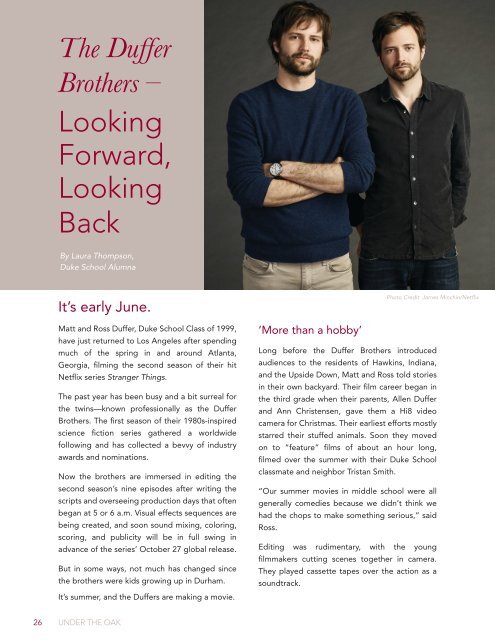


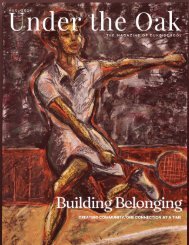
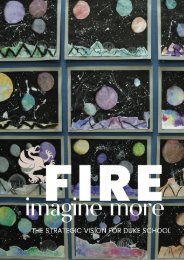
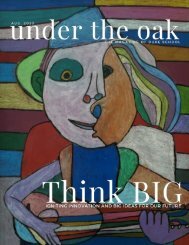


![Under the Oak 2023 [FINAL5] (1)](https://img.yumpu.com/68405392/1/190x245/under-the-oak-2023-final5-1.jpg?quality=85)

